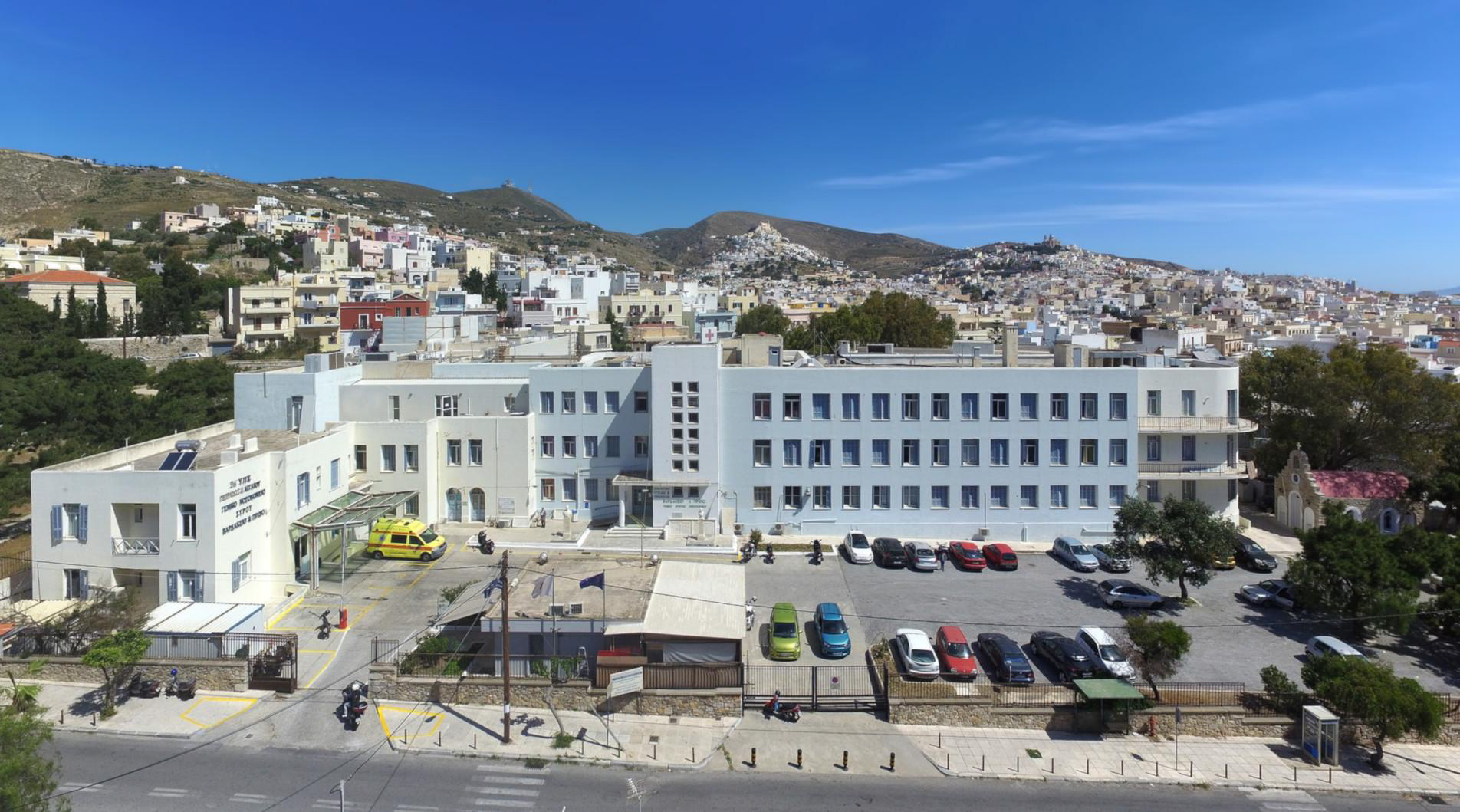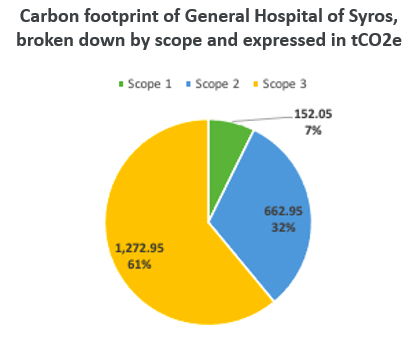Health care carbon management in the Mediterranean region
General Hospital of Syros, Greece
Case study summary
Since 2020, Syros General Hospital has developed a series of sustainable projects and initiatives to reduce its carbon footprint. The hospital began with the development of a carbon management plan that helped them understand the sources of their emissions and the actions they needed to implement.
Demographic information
The General Hospital of Syros serves the Cyclades Islands in Greece. It has a capacity of 150 beds, with an average of 90 occupied beds. The hospital covers most medical and surgical specialties, serves 50,000 patients, and has >500 employees.

The issue
Climate change has been described as the biggest global threat to health in the 21st century. The health care sector is a direct contributor to this problem and is estimated to account for 4.4% of net global GHG emissions (Health Care Without Harm, 2019).
The carbon footprint of the health care sector in Greece is 0.38 tons of carbon dioxide equivalent (tCO2e) per person (Health Care Without Harm, 2019). Our hospital’s carbon footprint for 2019 was estimated at 2,087.96 tCO2e, 7.3% of which were scope 1 emissions, 31.7% scope 2, and 61% scope 3. The carbon footprint per occupied hospital bed was estimated at 23.20 tCO2e.

Hospital goals
- Develop a carbon management plan
- Become a leader in low-carbon health care in the region
- Encourage change within other organizations locally and globally
- Gain recognition for successful policies/measures implemented and targets achieved
- Promote General Hospital of Syros’ successes in sustainable health care
Sustainability strategy implemented
In 2020, we joined Health Care Without Harm Europe's low-carbon health care in the Mediterranean region project, which supported us in creating an action plan to reduce our GHG emissions.
A dedicated carbon management team (CMT) was created and commissioned to work alongside Health Care Without Harm Europe to develop our CMP. This CMP outlines our hospital’s strategy for reaching our emissions reduction targets.
Our CMP was based on data collected during the baselining and target-setting phase of the project. This involved working with consultants Factor CO2 to establish a robust carbon footprint baseline against which targets could be set and progress measured. We chose 2019 as a reference year, as we had enough data from that year to calculate our baseline.
Implementation process
The first step of the process was the selection of a CMT to direct the project and raise awareness amongst staff about the issue and need for change.
We then calculated our carbon footprint for the baseline year (2019) and established reduction targets. Our carbon footprint includes emissions from scopes 1, 2, and 3, as defined by the Greenhouse Gas Protocol.
After we estimated our baseline, we set our emissions reduction targets for the CMP.
We have decided to align our emissions targets with the more ambitious 1.5℃ warming scenario set out in the Paris Agreement since a 1.5℃ scenario has been predicted to reduce negative impacts on ecosystems and human health compared to a 2℃ scenario. Our target is to reduce scopes 1 and 2 emissions by 16% by 2025 and 33% by 2030, and we also aim to achieve net-zero emissions by 2050. The table below summarizes the emissions reductions that our hospital has committed to with the implementation of our CMP.

Factor CO2 and Health Care Without Harm Europe developed a report to identify opportunities for emissions reductions, including cost-benefit analyses on the implementation of several of these initiatives. The implementation of a solar water heater was found to be the most cost-effective, with €301.68 benefit per ton of CO2e reduced.
Finally, all of this information was incorporated into our CMP following a template provided by Health Care Without Harm Europe, which maps out a strategy to achieve emissions reductions.

It has to work!
Tracking progress
The project followed a set schedule with regular reviews both internally and with our partners, and we worked alongside other hospitals within the low-carbon health care in the Mediterranean region project.
The Climate Impact Checkup tool developed by Health Care Without Harm was used to calculate our carbon footprint estimates, and we will continue to use this tool to track our progress.
Challenges and lessons learned
There were some uncertainties in the carbon footprint estimations since data for all scopes is very difficult to gather, particularly for Scope 3. For Scope 3, data was included for waste, water, and the transmission and distribution losses of electricity. We will focus on better defining and measuring these emissions over the following years before implementing reduction measures from 2025. Scope 3 targets are closely linked with the development of relative infrastructure by the Local Authority of Syros (ports, sanitary landfill, recycling plants.), and this is why we have chosen to address these emissions at a later stage.
Through this process, we also learned that communication is essential, not only within the CMT, but also amongst other staff at the hospital. Better communication allowed us to establish a common internal language that promoted more fluid progress through the stages of the project.
Next steps
We have further demonstrated our leadership and passion for sustainability by joining the Cool Food Pledge and Race To Zero initiatives, which solidify our commitment to reaching net-zero emissions by 2050 and becoming the first zero-carbon hospital in Greece. We would like to focus on identifying and implementing measures to reduce our Scope 3 emissions and meet our targets. We are also planning to develop an energy efficiency project, improve our waste management, and grow our electric vehicle fleet.
Links
- www.vardakeio.gov.gr
- Health care climate footprint report (Health Care Without Harm, 2019)
- Appendix C: Health care emissions national snapshots (Health Care Without Harm, 2019)
- Low-carbon healthcare in the Mediterranean region project
- Corporate Standard | Greenhouse Gas Protocol
- Climate Impact Checkup
- Healthcare decarbonisation toolkit: Experiences from the Mediterranean region
- GGHH award of 2020